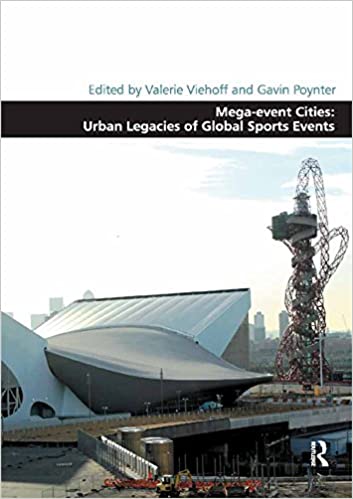Mega-events represent an important moment in the life of a city, providing a useful lens through which we may analyse their cultural, social, political and economic development. In the wake of the International Olympic Committee’s (IOC’s) concerns about ’gigantism’ and wider public concerns about rising costs, it was imperative in the C21st to demonstrate the long term benefits that arose for the city and nations from hosting premier sporting events. ’London 2012’ was the first to integrate the concept of legacy from the moment a bid to host the Olympic and Paralympic Games was being considered. London proposed an ambitious programme of urban renewal for East London. Subsequent host city bids have adopted the ’legacy narrative’ and, as this book demonstrates, aligned this to major schemes of urban development and renewal. Bringing together scholars, practitioners and policy makers, this book focuses upon the legacies sought by cities that host major sports events. It analyses how governments, the IOC and others define and measure ’legacy’. It also focuses upon the challenges and opportunities facing future host cities of mega-events, looking at their aspirations and the intended impact upon their domestic and international development. It questions what the global shift in geographical location of mega-events means for sports development and the business of sport, what the attractions are for cities seeking to harness the hosting of a mega-event, and whether there may be longer term consequences for the bidding and hosting major sporting events in the wake of the widespread social unrest that accompanied the preparations in Brazil for hosting the FIFA World Cup (2014) and the summer Olympics (2016) and in Turkey, where there was significant opposition to bid for the 2020 summer Olympiad.
چکیده فارسی
رویدادهای بزرگ، لحظه مهمی در زندگی یک شهر را نشان میدهند و لنز مفیدی را ارائه میدهند که از طریق آن میتوانیم توسعه فرهنگی، اجتماعی، سیاسی و اقتصادی آنها را تحلیل کنیم. در پی نگرانیهای کمیته بینالمللی المپیک (IOC) در مورد «غولگرایی» و نگرانیهای عمومی گستردهتر در مورد افزایش هزینهها، در C21st ضروری بود که مزایای بلندمدتی را که برای شهر و کشورها از میزبانی رویدادهای ورزشی برتر به وجود میآمد نشان دهیم. لندن 2012 اولین باری بود که مفهوم میراث را از لحظه ای که درخواست میزبانی بازی های المپیک و پارالمپیک در نظر گرفته شد، ادغام کرد. لندن یک برنامه جاه طلبانه برای نوسازی شهری برای شرق لندن پیشنهاد کرد. مناقصه های بعدی شهر میزبان «روایت میراث» را پذیرفته اند و همانطور که این کتاب نشان می دهد، آن را با طرح های اصلی توسعه و نوسازی شهری هماهنگ کرده است. این کتاب با گرد هم آوردن دانشمندان، پزشکان و سیاستگذاران، بر میراثهای مورد نظر شهرهایی که میزبان رویدادهای ورزشی بزرگ هستند، تمرکز دارد. این تحلیل میکند که چگونه دولتها، IOC و دیگران «میراث» را تعریف و اندازهگیری میکنند. همچنین بر چالشها و فرصتهای پیش روی شهرهای میزبان رویدادهای بزرگ تمرکز دارد و به آرمانهای آنها و تأثیر مورد نظر بر توسعه داخلی و بینالمللی آنها نگاه میکند. این سوال میپرسد که تغییر جهانی در موقعیت جغرافیایی رویدادهای بزرگ چه معنایی برای توسعه ورزش و تجارت ورزش دارد، چه جاذبههایی برای شهرهایی که به دنبال مهار میزبانی یک رویداد بزرگ هستند، چیست و آیا ممکن است پیامدهای طولانیمدتی برای این رویدادها وجود داشته باشد. برگزاری مناقصه و میزبانی رویدادهای ورزشی بزرگ در پی ناآرامی های اجتماعی گسترده که همراه با آمادگی در برزیل برای میزبانی جام جهانی فوتبال (2014) و المپیک تابستانی (2016) و در ترکیه بود، جایی که مخالفت های قابل توجهی برای برگزاری مناقصه در سال 2020 وجود داشت. المپیاد تابستانی.
ادامه ...
بستن ...
ISBN-13: 978-1472440174
ISBN-10: 147244017X
ادامه ...
بستن ...










